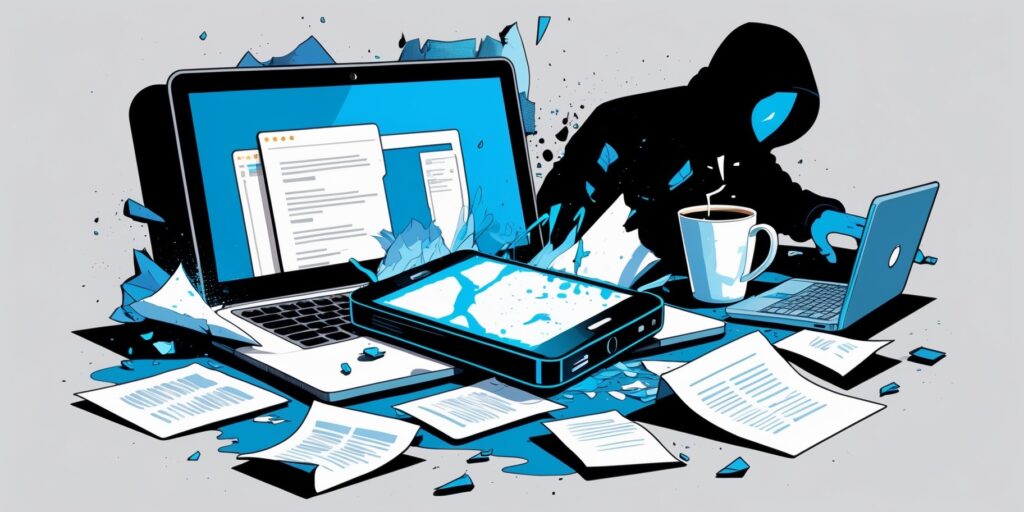The importance of data can’t be undermined these days. In fact, it’s now more important than ever.
From personal memories stored as photos and videos to critical work documents, everything we value lives on our devices or in the cloud. But here’s the uncomfortable truth: losing your data can be a disaster.
Everything can be wiped away with a single malware or hack attempt, and you can lose it all forever.
It can even lead to operational downtimes and the loss of customer trust. It’s a serious matter for businesses.
Whether you are an SME or an individual, data security and backups should be among your top priorities.
And that’s what we’re here to help you with.
This guide covers the importance of data backups and how you can ensure your data isn’t vulnerable. Let’s get started and see some of the best backup practices to keep your data safe and secure!
What is Data Backup And Why Is It Necessary?
Data backup refers to creating a duplicate of your files and storing them in a separate location. This copy serves as a fallback in case the original data is damaged, deleted, or compromised.
There are two primary options for backups: local (external hard drives or USBs) or cloud-based.
Businesses can invest more and also have private data storage mechanisms, which are highly protected and cannot be accessed without authorisation.
The goal is to ensure that you don’t lose your data, and even in the event of a mishap, you can safely proceed with operations.
If you still think that, “why go through all the trouble?”, then check out the following numbers:
- Every 11 seconds, a business falls victim to ransomware.
- 60% of small businesses shut down within 6 months of a significant data loss.
- Cybercrime is expected to cost the world $10.5 trillion annually by the end of 2025 (Cybersecurity Ventures).
These statistics clearly show that losing your data can result in a significant loss. Without backups, it becomes irreversible, and you may face severe consequences.
Some Common Reasons For Data Loss
Here are some of the most common reasons for data loss that impact both individuals and businesses:
1. Hardware Failure
This is one of the leading causes of data loss. And it can happen to even the best machines in the world.
If you have top-class storage devices, then the probability of them crashing is super low. However, it’s best not to take any chances and make backups that can be accessed reliably.
2. Malware and Ransomware Attacks
Cyberattacks are increasingly sophisticated these days, especially with the widespread adoption of AI. These attacks and hacks can corrupt the files, making the data inaccessible.
When you have a backup, you can easily access the data. However, be cautious not to connect your affected devices to the backup source. It can also corrupt your backup files, potentially resulting in data loss.
3. Human Error
Accidental data deletion is far more common than people think. For example, formatting the wrong drive, permanently deleting files instead of temporarily, overwriting essential files, etc.
4. Theft or Loss of Device
Losing your laptop, smartphone, or external drive, whether due to theft or misplacement, means your data is lost unless it has been backed up elsewhere.
5. Software Crashes or Glitches
Bugs or crashes in operating systems and apps can result in files becoming corrupted, inaccessible, or deleted altogether.
6. Security Breaches
Unauthorised access to your system can lead to intentional data deletion or corruption by hackers or disgruntled insiders.
Bottom line – Whatever the cause, you may lose data for any reason, but the only way to minimise damages is to have secure and up-to-date backups!
Companies can even end up losing customer data, website or other digital assets because of faulty or no backups.
Now that you understand the importance of backups, let’s see how often you should make them?
How Often Should You Back Up Your Data?
Frankly, backup needs for every case vary. Some data-sensitive businesses require real-time data backups, while others are fine with weekly backups.
Ask yourself this: “How much data can I or my business afford to lose?”
The point is that backups should be regular. You can also be strategic about backups – securing important files permanently with a full backup and then setting a routine for routine files.
Let’s now see the different types of backups.
What Are The Different Types of Backups?
Not all backups are the same. There are different purposes and intentions behind each of them. For example, some files are super important for businesses, and they can’t be risked at any cost.
On the other hand, some data is not so sensitive. It’s good to secure it, too, but the company won’t incur any severe damage if that data is lost.
So, it all comes down to different types of backups. Here they are:
1. Full Backup
This creates a complete copy of all your data. It’s usually done when a backup is being made for the first time. These tasks take time, so ensure that your devices are correctly charged and that no mishaps occur when you’re making the backup, or you may lose the data.
2. Incremental Backup
Incremental backups are made when you have to copy new files or changes in the existing files. This is a smart way to make backups as it’s quicker and takes up less space as well.
It’s perfect for companies that have more team collaboration.
Differential Backup
Differential backup makes copies of files that you create after the previous backup is made. Let’s say you made a backup at 5 P.M., so the differential backup will secure all the new data that was made after that time.
This is generally quicker, but if the file size is too heavy, it can take as long as a full backup.
Where to Store Your Backups?
This is an essential question for all businesses and individuals. If you’re careless with how you store your backups, then you’re not much better than someone with no backups at all.
Consider the options available. Whatever you choose, ensure that it’s absolutely safe and no one can access it without your permission.
External Hard Drives
These are convenient and small in size. They act as an extension of your computer’s storage.
Usually, people who have to move large amounts of data conveniently use them. For example, photographers, designers, videographers, etc.
They’re suitable for quick data backups and transfers, but storing sensitive information on them is risky, as they can malfunction and result in the loss of the backup.
Cloud Storage
You can use cloud storage to store your data online. It’s safer than external hard drives in the sense that your data is safe from physical damage.
Additionally, it allows you to access your files from anywhere and on various electronic devices.
Network Attached Storage (NAS)
NAS stands for Network Attached Storage. It’s essentially a smart external hard drive that connects to your home or office Wi-Fi network, not just to a single computer.
This lets multiple devices (laptops, phones, tablets) access the stored files anytime, anywhere on the network.
Offsite Storage
This option is usually utilised by large businesses that have huge datasets and can’t rely on external cloud services.
Offsite storage is done to protect data from all sorts of dangers like hacks, malware, theft, natural disasters, etc.
Offsite storage means keeping backups in a different location from your main data. This protects against theft or natural disasters.
How Can You Ensure Your Backups Are Secure?
Making backups is just one half of the equation. The other half is to keep it secure.
Suppose you’ve backed up your important files in a portable hard drive and left it lying on the office table, you’re inviting risks and troubles. Depending on your medium of storage, here are some ways to ensure that your backups remain secure.
Use Encryption
Encryption transforms your data into unreadable codes that can only be unlocked with the correct keys or passwords. This is especially helpful in case of hacks because even if someone accesses your data, it’ll be unreadable to them.
Set Strong Passwords
A strong password is long and unique. You should also add multi-factor authentication for sensitive data. This drastically reduces the chances of unauthorised access, and your files remain safe even if the password is compromised.
Automate Your Backups
Automation enables your system to create backups without requiring manual monitoring. You just set the schedule, and it’ll work on its own.
Take WhatsApp as an example – you just choose how frequently you want backups made, and it does the job on its own. Automation ensures consistency and removes the human error factor.
Regularly Test Your Backups
Simply having backups is not enough. You must verify that they can be restored smoothly when needed.
So, test your backups routinely that way, if there’s ever an anomaly or failures, you have the original files available to backup again.
What Tools Can Help With Data Backup?
Several software programs are available to help you build your backups.
It just depends on your needs and priorities. For example, if you are dealing in cryptocurrencies, you’d likely want hardware wallets.
Similarly, photographers and videographers would need solutions that can handle large datasets and assist with quick data transfers. Business owners would want something that’s comfortable and offers automation.
So, it really varies. But here are some tools that you can consider:
- iDrive – Great for multi-device personal backups with strong encryption.
- Backblaze – Perfect for unlimited cloud backup with a simple setup.
- Veeam – Enterprise-grade solution for hybrid and virtual environments.
- Datto – Perfect for MSPs offering managed backup services.
- Trezor/Ledger – For cryptocurrency users, a secure offline hardware wallet backup.
- Google Drive/Dropbox – Good option for personal use, basic file sync and cloud access.
- Macrium Reflect – Trusted for disk cloning and full image backups.
These are just some of the many options available. Explore the options and choose the one that meets your needs the best.
Now we’ll move to a super important part of the article: what are some mistakes that you should absolutely avoid when making backups!
What Should You Avoid In Data Backup?
A common problem with backups is that people treat them as something “nice to have.” That’s why they don’t really take it seriously.
However, imagine the worst that could happen if you don’t have backups and prepare to avoid those gruesome situations. That’s how you’ll have reliable backups that save you in times of need.
Avoid these two common mistakes!
- Not Having Multiple Copies
Make more than one copy and store them in different places for better security.
- Avoiding Backup Device Updates
See that all your backup devices have the latest software version so they don’t fail whenever you need them.
Take Action To Protect Your Data Today!
Whether you’re protecting your business, memories, or anything else, implementing a secure backup strategy lets you live with peace of mind.
That’s especially important in the unpredictable digital world where cybercriminals are ready to take advantage of you at any opportunity they get.
Don’t wait for a disaster to strike. Get in touch with our experts to get personalised consultation. We’ll build you backup solutions that meet your goals, budget, and workflow, the best!










